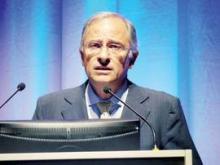LONDON – Low-molecular-weight heparin therapy reduced the risk for recurrent implantation failure, improved pregnancy rates, and increased the number of live births in women who had failed prior fertility treatment in a 126-patient pilot study.
As reported at the annual meeting of the European Society of Human Reproduction and Embryology, low-molecular-weight heparin (LMWH) was associated with an implantation rate of 22.2% vs. 10% for a regimen containing aspirin (P =.0136). Pregnancy (47% vs. 20.6%, P = .0026) and live birth rates (30% vs. 12%, P = .017) also were higher with the LMWH than with the aspirin-containing regimen.
Although larger, randomized, double blind controlled trials are needed to confirm the findings, the study’s Italian investigators are confident that LMWH has a benefit in improving fertility outcomes in this population of women who had failed two or more cycles of in vitro fertilization (IVF).
"We are convinced that low-molecular-weight heparin can enhance results in IVF procedures," said Dr. Antonio Colicchia of the Centro Fecondazione Assistita Ferticlinic, Rome, in an interview.
Strategies to improve implantation rates are needed, Dr. Colicchia explained, because there has been a plateau in live birth rates associated with assisted reproductive technology (ART). Approximately 4.2% of babies born in Europe are a consequence of ART, he said.
Women were included in the single-center study over a 2-year period starting in September 2000. For inclusion they had to have a body mass index lower than 25 mg/kg2, be between 31 and 42 years old, have failed at least two cycles of IVF, and not have inherited thrombophilia.
Sixty-eight women were allocated to treatment with the LMWH dalteparin at a dose of 2,500 IU/day and 58 to treatment with aspirin at a dose of 100 mg/day and oral prednisone at a dose of 10 mg/day. Both groups of women also were given vaginal progesterone at a dose of 600 mg/day.
Treatment began at the time of embryo transfer and was continued until levels of human chorionic gonadotropin confirmed a pregnancy. If a pregnancy was confirmed, then treatment was continued until the 12th gestational week. Women administered the treatments at home.
"Heparin can potentially modulate many of the known mechanisms that underlie successful apposition, adhesion, and penetration of the developing embryo," Dr. Colicchia said.
"There is evidence that in women with repeated IVF failure, [LMWH] can improve pregnancy rates," he concluded, although further studies are needed.
The chairman of the session in which the study results were presented was critical of the findings. "This was not a randomized nor a placebo-controlled trial," Dr. Thomas D’Hooghe of Leuven (Belgium) University fertility center said in an interview. Furthermore, the control arm was flawed, as aspirin and oral prednisone are not routinely used.
Elsewhere at the annual meeting of ESHRE, a German team presented data from a 12-center trial (n = 449) on the use of LMWH in the prevention of recurrent miscarriage. The results of the ETHIG II study, in which dalteparin (5,000 IU/day) plus multivitamins were compared with vitamins alone, were not positive.
There was no difference in the primary outcome measure of the number of ongoing pregnancies at 24 complete weeks of gestation, leading the authors to conclude that "the uncontrolled use of LMWH in patients with recurrent miscarriages is not reasonable."
There was no commercial funding for the study presented by Dr. Colicchia. He reported having no relevant financial disclosures. Dr. D’Hooghe was not involved in the study and said he had no relevant conflicts of interest.


